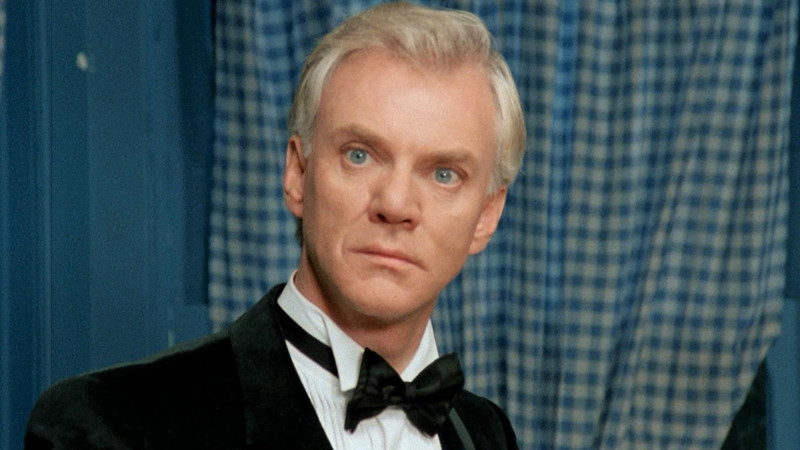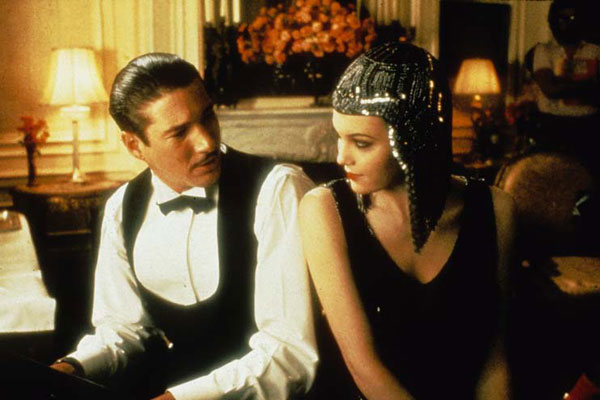
The 1980s were a lucrative, glorious time for the movies. The blockbuster ruled the box office, and cinema-going was at its highest for decades. Star Wars, Indiana Jones and Back to the Future dominated popular culture, with sequels and franchises ensuring fans kept coming back to the theatre to see their favourite stars up on the big screen.
But for every sci-fi mega hit and breathtaking adventure flick, there were dozens of more understated films which, though making some mark at the time, have faded somewhat as the decades have gone by. Below are ten more great overlooked films of the 1980s of various genres.
1. Split Image (1982)

Split Image, released in 1982, stars Michael O’Keefe as Joshua, a college gymnast, supposedly clean cut, who is lured into a youth religious cult by Rebecca (Karen Allen), which is led by Kirklander, played by Peter Fonda. At first he is sceptical, but soon learns to see things Kirklander’s way. Troubled, his parents (Brian Dennehy and Elizabeth Ashley) hire a bounty hunter named Charles Pratt (played by James Woods) to take him out of the cult by force and reverse the brainwashing he has been subjected to.
Split Image is very entertaining in its own right, but also raises genuine concerns over organised religious cultism, and the danger of following a supposed guru. Directed by Ted Kotcheff, it avoids melodrama and predictability, and benefits from a group of very strong performances. The best, perhaps, come from Dennehy and Woods; Dennehy the stressed, well-meaning father, Woods the ballsy live-wire hired to exorcise the young man’s mind. In the deprogramming sequence, he tries to degrade the image of Kirklander by spitting on his picture, then setting fire to it. In the end, Woods comes up with a better method; brutalising the boy’s father in front of him, even spitting on him too, in a bid to bring back to the surface the undying love he has for him. It is this paternal link that revives Joshua.
Split Image is a treat for fans of slightly grainy, obscure 80s cinema, and anyone who loves solid actors doing their thing with a good, tight script.
2. The Cotton Club (1984)

Francis Ford Coppola’s sweeping musical crime drama The Cotton Club was a notorious flop upon release, making back only half of its 58 million dollar budget. These days, it is looked back upon as a kind of underrated gem, a mid-period standout from Coppola’s long and winding career.
Coppola first accepted the assignment to write and direct the film to pay off debts from his earlier film, One from the Heart, and Robert Evans was on board as producer, having previously expressed some desire to direct the picture. Beginning with a 13 million budget, naturally it swelled and swelled to over 50, and original co-screenwriter Mario Puzo was replaced by William Kennedy. It was a troubled, complex production, but the film itself came out well, though it did take some time before people started to appreciate it.
It is set in the 1930s and focuses on the activity around a Harlem club called The Cotton Club. Richard Gere is the central figure, musician Dixie Dwyer, who works with the mob in a bid to further his fledgling career and ends up falling for a head mobster’s girlfriend. Gregory Hines is Sandman Williams, a dancer who starts working at the club, which is run the gangster, Owney Madden, played by Bob Hoskins. Fred Gwynne is Frenchy, Owney’s much larger right hand man, played beautifully by the former Munsters star.
It may be down to personal taste, but as good as the plot is for The Cotton Club, as interesting the main characters are, and as dazzling as the dance sequences may be, for me the main reason to watch the film is to enjoy the chemistry between those two unlikely buddies, Hoskins and Gwynne. They enjoy the best scenes in the movie together, and it’s well known that many of their moments were improvised; most memorably of all the famous watch scene. There is a magic around whenever Bob and Fred are on screen together, and all these years on their sequences carry a lot of charm that make you wish these two characters had had their own spin off movie.
The Cotton Club, in typical Coppola style, has had a very storied life, with cuts and re-cuts making their way out on restored editions, while the complexities surrounding its release could fill a thousand page book in their own right. All this aside though, it’s a picture well worth dusting off and taking another look at.
3. Target (1985)

Another decent film from the 80s, and also totally overlooked, was 1985’s Target. Directed by Arthur Penn, it concerns the kidnapping of a woman, Donna Lloyd (Gayle Hunnicutt). Gene Hackman is her husband, Walter, and Matt Dillon is Chris, her son, and together they set about finding her. Unfortunately, the pair do not get on, Chris seeing Walter as a stodgy man of inaction. With the disappearance of Donna however, Walter steps into gear and comes to life, for the first time emerging from his comfort zone and being the man Chris so often wished him to be.
A totally overlooked entry in Dillon, Hackman and Penn’s careers, Target is an engaging thriller that brings forth intriguing father-son dynamics and predicaments. It was in this era that Hackman was choosing to play mature men, fathers who either hoped for better connections with their kids or knew that any such hopes were dead in the water. Here, they bond over the most unexpected thing, and find solidarity in their quest. Dillon is pure angst through and through, rebelling against Hackman at first but ultimately seeing eye to eye with him. It’s a film, though, driven by its plot, its twists and its turns, a good old fashioned thriller directed wonderfully by the masterful Penn.
4. True Confessions (1981)

Following up the monumental performance in Raging Bull was never going to be easy for Robert De Niro, and rather than going down the predictable route of playing another heavy, the actor chose to play a priest in Ulu Grosbard’s quiet but interesting True Confessions.
Starring alongside Robert Duvall, the two men played brothers working in radically different areas of life. Duvall is the cop on the seedy case of a murdered Catholic prostitute, while De Niro is the priest who perhaps knows a little too much about the sleazy slaying in question, a man whose career could hang in the balance if it were to become public knowledge that he was remotely involved with the victim.
True Confessions is a grimy and carefully subtle film, a sharp contrast against his truly electrifying work in Raging Bull. It’s a film filled with solid performances, especially from a brilliant Duvall who perfectly embodies the determined detective. Charles Durning, always a stand out in any film, also makes a larger than life appearance. Playing against type, De Niro’s input is simply excellent. After such an angry and extroverted display as La Motta, he downplays Father Spellacy, showing us the viewer that not only less is more, but sometimes nothing at all is all you need. De Niro takes the approach, especially in lower key roles as this, that you do not need to patronise or emotionally manipulate your audience into “understanding” the character’s motives or the aims of the film makers.
If you like subtle drama, a good mystery, and fine acting from highly talented character actors, then seek out this curious gem; you’ll be pleasantly surprised.
5. White Star (1983)

White Star is a demented little lost gem from director Roland Klick, filmed in Germany, with Dennis Hopper cast as an ageing rock music promoter by the name of Ken Barlow (no relation to Coronation Street’s longest serving resident you understand) who seems permanently pissed off by the new punk rock hostility he is working amidst.
This was, it needs to be noted, one of the movies Dennis made while completely high as a kite; or as he might have put it himself, one of the films where he used drugs to merely get through. Though not a fantastic film by any stretch, it is great viewing for a Hopper fan, as it gives him plenty of opportunities to go absolutely bonkers. This is, effectively, Dennis Hopper unleashed. It’s an insane performance, totally over the top but addictive viewing all the same. And the Dennis Hopper ash tray at the start and end of the film is a must have for every household.
Dennis clearly had no love for White Star and definitely did it for the money. It may have been junk to Hopper, and indeed may not be a very good picture in the scheme of things, but for some perverse reason it’s satisfying and rewarding to watch Dennis Hopper being utterly off his trolley. Maybe it’s because we’re so used to stars these days always looking their best on screen, unable to show their grotesque side and let loose, that Hopper’s exposed, bare self punishment is almost too much to even comprehend. This is raw stuff after all. For a let loose Dennis Hopper then, look no further than White Star – it does not disappoint.